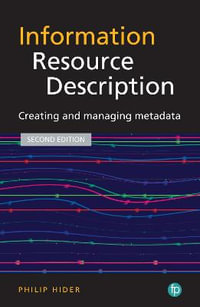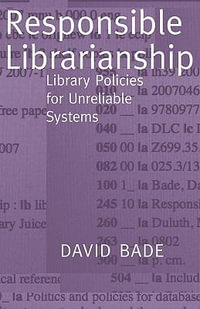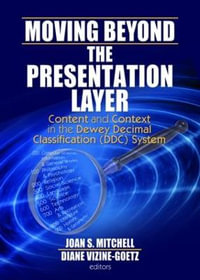Libraries organize their collections to help library users find what they need. Organizing library collections may seem like a straightforward and streamlined process, but it can be quite complex, and there is a large body of theory and practice that shape and support this work. Learning about the organization of library collections can be challenging. Libraries have a long history of organizing their collections, there are many principles, models, standards, and tools used to organize collections, and theory and practice are changing constantly.
Written for beginning library science students, Organizing Library Collections: Theory and Practice introduces the theory and practice of organizing library collections in a clear, straightforward, and understandable way. It explains why and how libraries organize their collections, and how theory and practice work together to help library users. It introduces basic cataloging and metadata theory, describes and evaluates the major cataloging and metadata standards and tools used to organize library collections, and explains, in general, how all libraries organize their collections in practice. Yet, this book not only introduces theory and practice in general, it introduces students to a wide range of topics involved in organizing library collections. This book explores how academic, public, school, and special libraries typically organize their collections and why. It also discusses standardization and explains how cataloging and metadata standards and policies are developed. Ethical issues also are explored and ethical decision-making is addressed. In addition, several discussion questions and class activities reinforce concepts introduced in each chapter. Students should walk away from this book understanding why and how libraries organize their collections.
Industry Reviews
Dr. Hoffman has written a much-needed primer for understanding the basics and importance of cataloging in libraries. Students new to librarianship and practitioners looking to refresh their cataloging knowledge would benefit from reading Dr. Hoffman's straightforward, richly illustrated narrative. The end-of-chapter discussion questions and class activity suggestions make this the perfect text for information organization courses and interactive study for practitioners. -- Karen Snow, associate professor, School of Information Studies, Dominican University
As a teacher of both organization of information and cataloging in a library school program, I can confirm what she acknowledges: that this is a topic that students come to in library school with little or no knowledge of and the overwhelming number of acronyms used in this branch of LIS. So I am happy to see that the book is very straightforward in its language; it assumes no prior knowledge and explains concepts in layman's terms. -- Sarah W. Sutton, Ph.D., associate professor, School of Library & Information Management, Emporia State University

























